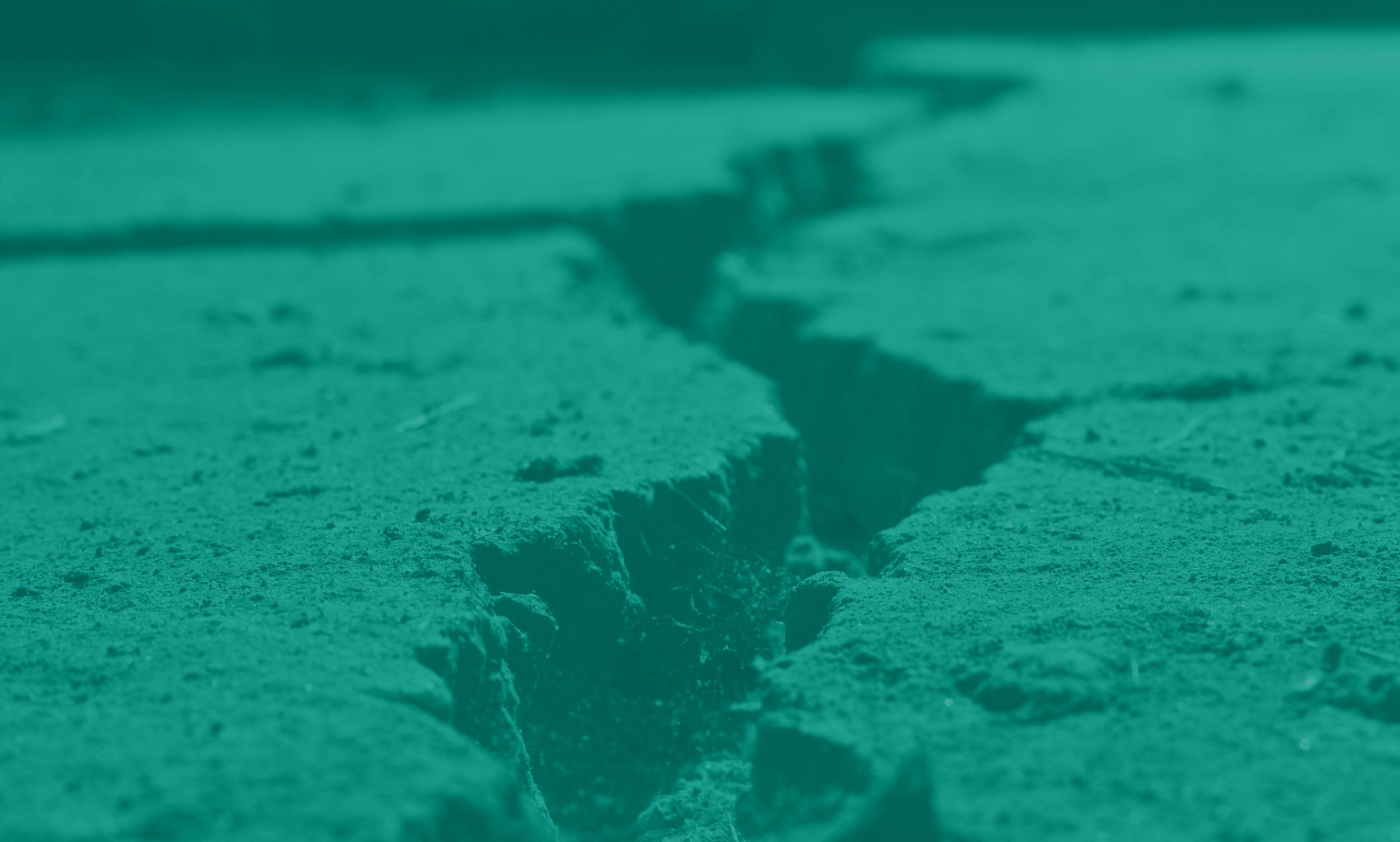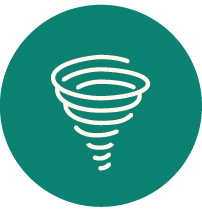
Earthquake preparedness guide: How to minimize and protect yourself from earthquake-related damage
Did you know approximately 5,000 earthquakes occur across Canada each year?
Coastal British Columbia is at the highest risk for earthquakes, followed by the Yukon, and along the St. Lawrence River and Ottawa River valleys in Ontario and Quebec.
That said, all provinces and territories have had confirmed earthquakes.
While most earthquakes in Canada are small and not felt by humans, experts say it’s only a matter of time before a large-scale earthquake hits, causing extensive damage to Canadians’ homes, businesses and farms.
Acera Insurance does more than just offer coverage to protect against a variety of threats — we also educate and empower our clients to minimize risk.
Our earthquake preparedness guide provides information that can help you proactively minimize damage that an earthquake may cause to your home, business or farm. We also explain which insurance policies offer protection against earthquake-related losses and how to file an insurance claim.
Contents
- Protect your home from earthquakes
- Understanding earthquake insurance for your home and vehicle
- Protect your business from earthquakes
- Understanding earthquake insurance for your business
- Protect your farm from earthquakes
- Understanding earthquake insurance for your farm
- Stay safe during an earthquake
- How to file an earthquake insurance claim
- Answers to your earthquake insurance questions
- Additional severe weather resources
Earthquake information for individuals
Protect your home from earthquakes
You may not be able to prevent an earthquake, but you can take precautions to help reduce the damage that an earthquake may cause to your home and belongings.
- Secure heavy furniture and shelving units to the wall to prevent them from tipping during an earthquake.
- Keep heavy and breakable items on lower shelves.
- Securely anchor mirrors, pictures and other hanging objects to the wall.
- Do not hang objects (i.e., mirrors, framed pictures, shelves) around your bed, couches or chairs.
- Use latches to secure all cupboard and cabinet doors to prevent the contents from spilling out.
- Use straps to securely anchor your water heater to the wall.
- Anchor other heavy appliances (i.e., stove, washer) as they may break gas or water lines if they shift or topple over during an earthquake. You may also consider hiring a professional to install a flexible gas line.
- Use anti-skid pads, Velcro or buckles to secure TVs, computers, stereos, microwaves and other small appliances to desks, tables or countertops.
- Repair or replace loose roof shingles.
- Prune or remove trees and branches that are close to your roof or power lines.
It’s also important that you and your household know how to turn off the water, electricity and gas in your home in the event of an earthquake. It’s recommended that you clearly label the on-off positions for your water, electricity and gas so there’s no second guessing in an emergency.
Creating and maintaining a home inventory list can help the claims process go smoother if you experience earthquake-related damage or loss.
When creating — and updating — your home inventory, we recommend:
- Going through your home, room by room, to document and photograph your possessions and belongings. Your inventory should include a detailed description, serial number, purchase date and estimated value for each item.
- Safely storing your receipts.
- Creating 360-degree-view videos inside and outside your home. This can help capture your belongings, and also any upgrades or additions to your property.
Update your home inventory once a year at minimum and keep it in a safe spot. Keep at least one copy offsite and regularly back up digital copies.

Understanding earthquake insurance for your home and vehicle

Earthquakes are not automatically covered by property insurance policies, such as:
- Homeowner insurance
- Condo insurance
- Tenant insurance
Fortunately, you can often add coverage for earthquake damage to your policy or purchase a separate earthquake insurance policy that will provide coverage should a quake damage your property and belongings.
Earthquake insurance can help cover costs to repair or replace your property and belongings (i.e., furniture, appliances, electronics, valuables) that have been damaged by an earthquake.
The type of earthquake coverage you need will depends on your living situation. For example:
- If you own a house, earthquake insurance can offer coverage to repair or rebuild your house and other structures (i.e., garage, fence), as well as to repair or replace your belongings.
- If you own a condo, earthquake insurance can offer coverage to repair or replace your damaged belongings. It can also cover upgrades or enhancements you have made to your unit, as well as your share of expenses should the condo corporation’s building insurance policy not be sufficient to cover damage to the structure (this is called loss assessment coverage).
- If you rent, earthquake insurance can offer coverage to repair or replace your damaged belongings. The property owner will be responsible for costs to repair or rebuild the building itself.
Whether you own or rent, earthquake insurance also provides additional living expenses. This can help cover any extra costs associated with temporary relocation if your property is deemed unlivable while undergoing repairs following earthquake damage.
Additional living expenses are subject to a certain limit, so speak with your Acera Insurance advisor to ensure you have enough coverage to pay for expenses such as hotel rooms, meals and transportation.
Earthquake insurance typically does not cover:
- Landslides
- Sinkholes
- Tsunamis
Earthquake insurance only covers damage and loss caused by the earth shaking, and not other disasters that a tremor may cause — such as fires and floods. But you can protect yourself from these additional risks. For example:
- If an earthquake causes a gas main to break and a fire starts, any fire or smoke-related damage to your property and belongings would be covered under your homeowner, condo or tenant insurance policy.
- If an earthquake ruptures a dam or levee along a river, causing the water to overflow its banks, the water-related damage to your property and belongings would be covered if you’ve added the overland water endorsement to your homeowner, condo or tenant insurance policy.
No, earthquake insurance does not provide coverage for earthquake-related damage to your vehicle.
You can, however, protect your vehicle from earthquake-related damage by adding comprehensive coverage to your auto insurance policy.
Yes, earthquake insurance includes a deductible.
A deductible is the amount you agree to pay to cover insured losses. Earthquake insurance deductibles tend to be higher than other types of insurance — sometimes as high as 15% or 20% of your policy’s coverage limit.
For example, say you insure your home and belongings for $500,000 (this is your coverage limit) and your earthquake insurance deductible is 15%. If your home is deemed a total loss following an earthquake, the maximum amount you’d receive from your insurer would be $425,000 as your deductible would equal $75,000.
Please contact a member of our team if you have any questions about earthquake insurance for your home, condo, rental or vehicle.
Earthquake information for businesses
Protect your business from earthquakes
Earthquakes may be unpredictable, but you can still prepare your business before one hits.
Preparing your business for an earthquake includes:
- Minimizing potential property damage
- Creating a plan to keep employees safe
- Minimizing potential business interruptions
- Ensure your business premises is up to building codes. You may want to consider hiring an engineer to conduct the inspection.
- Prune or remove trees and branches that are close to your roof or power lines.
- Secure, bolt, anchor or fasten anything that could move or fall during an earthquake, including shelves, cabinets, tall and heavy furniture, equipment, machinery, electronics and more.
- Ensure all large and/or heavy objects are stored on lower shelves or on the floor.
- Ensure fire sprinklers are installed and working.
- Install safety latches to cabinet doors.
- Keep the space beneath desks and tables clear and easily accessible for employees to shelter under during an earthquake.
- Work with your property owner or facilities manager to have laminate or plastic film added to the inside of windows to minimize the likelihood of shattered glass in the event of an earthquake.
- Be prepared for potentially lengthy power outages; review your power options, such as generator requirements.
- Ensure databases, programs and software that are essential to your operations are backed up at least daily, including in an off-site location.
- Know where to access and how to turn off utilities like electricity, water and gas.
Protecting your employees is the top priority when an earthquake hits.
As earthquakes are unpredictable and can strike without any warning, your business needs to proactively prepare and educate your employees on how to stay safe during a tremor. Here’s how:
- Create an evacuation plan that identifies exits, fire escapes, stairways and a central meeting point in a safe area. Educate your employees and test your plan.
- Identify who on your team is Community Emergency Response Team (CERT) and CPR certified and ensure they are aware of their responsibilities during and immediately after an earthquake.
- Determine how your disaster response team will communicate with one another and all employees as part of your earthquake response plan. Remember, phone lines and cell towers may be damaged and down following an earthquake, so plan for alternative means of communication.
- Educate your employees on how they can protect themselves during an earthquake (for example, drop, cover and hold on). You can learn how to stay safe during an earthquake here.
- Assemble and store a fully stocked emergency supply kit and keep a first aid kit on hand.
An earthquake can directly or indirectly impact your business operations.
For example, your business premises or key equipment could be damaged during the earthquake.
Or, even if your property and belongings are left unscathed, one of your key suppliers could be affected by the earthquake resulting in shortages and backlogs.
No matter the situation, a business continuity plan can be helpful in making necessary arrangements and adjustments to maintain a certain level of operation during the recovery period following an earthquake.
Your business continuity plan should provide clear direction for how to:
- Communicate with employees.
- Set employees up to work in another location or remotely, if needed.
- Manage supply chain logistics and potential shortages.
- Carry out essential services and functions of your operations.
- Access key data, systems and equipment.

Understanding earthquake insurance for your business

Standard commercial property insurance policies exclude coverage for earthquakes.
To be covered for earthquake-related damage, your business will need to have earthquake insurance.
Earthquake insurance for your business can help cover the costs to repair or replace damaged property, such as:
- Equipment and machinery
- Computers, printers, telephones and other electronics
- Inventory and stock
- Office furniture
Earthquake insurance for businesses also covers:
- Damaged buildings and exterior fixtures (i.e., signage, fencing, landscaping)
- Debris removal and cleanup costs
- Business interruption insurance can help your business recover lost revenue resulting from an insured loss — such as earthquake-related property damage — or if a mandatory evacuation order forces you to close your doors for a period of time.
- Commercial auto or fleet insurance can help you repair or replace vehicles damaged by an earthquake if you choose to include comprehensive coverage as part of your policy.
- Commercial property insurance can cover additional damage and loss that an earthquake may trigger, such as a fire.
- Overland water can cover water-related damage and loss if an earthquake causes flooding, such as by rupturing dams or levees along a river.
Keeping records of receipts and invoices for your business inventory, stock, products, contents and equipment can help streamline the claims process should you need to file an earthquake insurance claim.
We recommend that you also document both the interior and exterior of your business premises as these photographs or 360-degree videos can help you keep track of contents and upgrades.
You should assess and update your business inventory once or twice a year at a minimum, providing your Acera Insurance advisor with your most current list.
Earthquake information for farms
Protect your farm from earthquakes
Use the proactive tips above to protect your home and business operations, no matter if you run a hobby farm, a large-scale commercial farming operation or anything in between.
- Create a livestock emergency kit that includes feed, water, temporary identification supplies, handling equipment and tools, as well as documents like a current list of your animals, proof of ownership and veterinary records.
- Create an emergency plan that lists contact information for employees, neighbours, veterinarians, animal shelters, transportation and more.
- Determine a plan of action that aligns with recommended earthquake safety tips.
- Regularly assess your animal shelters and repair, reinforce or rebuild as necessary.
- Ensure you have enough water and food to sustain your animals for several days after an earthquake.

Understanding earthquake insurance for your farm

An earthquake can cause:
- farm structures to collapse
- damage to vehicles, farm equipment and machinery
- crops to be unearthed
- injury or death among livestock
- business interruptions
Fortunately, insurance can help you rebound from earthquake-related losses. Let’s break down the policies that can offer protection:
- To ensure your property (i.e., home, barns, facilities) and belongings (i.e., machinery, equipment) are protected from earthquake-related damage you need to have earthquake insurance. This is because earthquake-related damage and loss are not covered by policies such as homeowner insurance and commercial property insurance.
- To ensure your vehicles are protected from earthquake-related damage, you will need to have comprehensive coverage as part of your auto or fleet insurance policy.
- Livestock insurance can include coverage for injuries associated with natural catastrophes, while animal mortality insurance includes coverages for death as a result of severe weather.
- Business interruption insurance can help cover essential costs if your farm operations are directly or indirectly affected by an earthquake. For example, even if your farm doesn’t sustain earthquake-related damage, your commercial farming operation could be halted by road closures and supply chain shortages due to an earthquake.
Stay safe during an earthquake
- Stay where you are — do not attempt to move outdoors or to another room as you may be knocked over or hit by falling objects.
- Drop, cover and hold on: Get under heavy furniture (i.e., table, desk), cover your head and neck to protect yourself from falling objects, and hold on to the piece of furniture so you remain covered.
- If you are unable to quickly find a heavy object to shelter under, flatten yourself or crouch against an interior wall.
- Do not stand in doorways as you can be hurt if the door slams shut.
- Stay away from windows as they can shatter.
- Stay away from shelves with heavy objects that can fall.
- Avoid elevators. If you are in an elevator during an earthquake, get out as soon as you can — push the button for every floor and get off at the first opportunity.
- Stay outside.
- Move to an open area that is away from buildings, power lines and other things that could collapse or fall.
- Do not stand near the coastline as earthquakes can trigger tsunamis.
- Pull over to a safe place away from bridges, overpasses, underpasses, buildings and anything else that could collapse. Do not block the road as this could slow down emergency crews.
- Stop your car and stay inside, listening to the radio for any information, updates or directions from emergency officials.
- Do not get out of your car if downed power lines are on it. Wait to be rescued.
- Stay put and count to at least 60 after the shaking stops to give objects time to settle.
- Only call emergency services for severe and life-threatening concerns.
- Place a “HELP” sign in your window or vehicle if you need assistance.
- Move cautiously and stay alert for potential hazards and unstable objects above and around you.
- Be prepared for aftershocks. These can occur anywhere from minutes to days after an earthquake. If an aftershock hits, follow the safety instructions listed above.
- If you’re able to, change into closed, sturdy footwear, pants and a long sleeve shirt to protect yourself from debris.
- If your home has been significantly damaged and is unsafe, leave immediately and find a safer location.
- Stay at home only if it’s safe to do so, or if emergency officials permit you to do so.
- Do not light matches or turn on lights and other appliances until you’re certain there are no gas leaks or spilt flammable liquids.
- If tap water is still flowing, fill your bathtub and/or other containers in case the water is cut off.
How to file an earthquake claim
Follow these steps if you have experienced earthquake-related damage or loss:
- Contact us at your earliest convenience — we’re here to support you through the process.
- Document the damage once it is safe to do so; take photographs and detailed notes.
- Keep all receipts related to cleanup, repairs, replacements and temporary extra living expenses.
You can find answers to common claims questions here.
Answers to your earthquake insurance questions
There are approximately 5,000 earthquakes in Canada every year.
While most of these are small and indiscernible, experts say it’s a matter of when — not if — a large-scale earthquake will hit.
A 2013 report commissioned by the Insurance Bureau of Canada estimated that a magnitude 9.0 earthquake in coastal British Columbia could result in $20 billion in insured losses.
To help put this into perspective, the costliest severe weather event on record in Canada was the 2016 Fort McMurray wildfire, which resulted in $5.96 billion in insured losses.
The amount you’ll pay for earthquake insurance will depend on the level of risk you present.
Insurers look at several factors when determining earthquake insurance premiums, including:
- The value of your property and belongings (this is your coverage limit)
- The construction of your property (i.e., materials, year built)
- The number of floors in your property
- How prone your location is to earthquakes
Want to know how much you’ll pay for earthquake insurance? An Acera Insurance advisor can provide you with a free quote — contact us today.
For most insurance policies, you get to choose your deductible from a set dollar amount (i.e., $500).
Earthquake insurance works differently as the deductible is calculated as a percentage.
Earthquake insurance deductibles can range from as low as 2% to as high as 20%, depending on several factors, including:
- The construction and structure of your property
- The age of your property
- How prone your location is to earthquakes
For example, assume your earthquake insurance deductible is 10%, and your earthquake insurance coverage limit is $100,000. In the event of a covered loss, the maximum amount you would receive from insurance to repair or replace your home is up to $90,000, as your deductible equals $10,000 (subject to policy terms and conditions).
Earthquake insurance deductibles are typically higher when there is a greater risk of damage, such as living in an area prone to earthquakes.
Want to know what percentage your earthquake insurance deductible will be? An Acera Insurance advisor can provide you with a free quote — contact us today.
Additional severe weather resources

Flood preparedness guide
Learn how to insure your home and business against flooding and how to minimize flood damage.

Wildfire preparedness guide
Learn how to insure your home and business against wildfires and how to minimize damage caused by these blazes.

Hail preparedness guide
Learn how to insure your home, business or farm against hail and how to minimize damage caused by these storms.

Tornado preparedness guide
Tornadoes can form quickly, resulting in extreme winds and thrown debris that can cause extensive damage to homes, vehicles, businesses and farms in a short period of time. While parts of Canada are more prone to tornadoes, a twister can touch down anywhere. These tips can help you be prepared.

Hurricane preparedness guide
Learn how to insure your home, business or farm against hurricanes and how to minimize damage caused by these storms.
